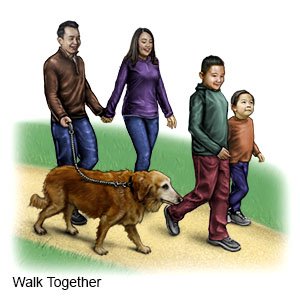Depression
Medically reviewed by Drugs.com. Last updated on Aug 4, 2025.
What is depression?
Depression is a mood disorder that causes feelings of sadness or hopelessness that do not go away. Depression may cause you to lose interest in things you used to enjoy. These feelings may interfere with your daily life.
What causes or increases my risk for depression?
Depression may be caused by changes in brain chemicals that affect your mood. Your risk for depression may be higher if you have any of the following:
- Stressful events such as the death of a loved one, unemployment, or divorce
- A family history of depression
- A chronic medical condition, such as diabetes, heart disease, or cancer
- Drug or alcohol use
What are the signs and symptoms of depression?
- Appetite changes, or weight gain or loss
- Trouble falling or staying asleep, or sleeping too much
- Fatigue (being mentally and physically tired) or lack of energy
- Feeling restless, irritable, or withdrawn
- Feeling worthless, hopeless, discouraged, or guilty
- Trouble concentrating, remembering things, doing daily tasks, or making decisions
- Thoughts about hurting or killing yourself
How is depression diagnosed?
Your healthcare provider will ask about your symptoms and how long you have had them. Your provider will ask if you have any family members with depression. Tell your provider about any stressful events in your life. Your provider may ask about any other health conditions or medicines you take.
How is depression treated?
Treatment depends on how severe your symptoms are. You may need any of the following:
- Cognitive behavioral therapy (CBT) teaches you how to identify and change negative thought patterns.
- Antidepressant medicine may be given to decrease or manage symptoms. You may need to take this medicine for several weeks before they start working. Tell your provider about any side effects or problems you have with your medicine. The type or amount of medicine may need to be changed.
Treatment options
The following list of medications are related to or used in the treatment of this condition.
Related medications
What can I do to manage depression?
- Talk to someone about your depression. Your healthcare provider may suggest counseling. You might feel more comfortable talking with a friend or family member about your depression. Choose someone you know will be supportive and encouraging.
- Get regular physical activity. Physical activity can lower your stress, improve your mood, and help you sleep better. Work with your healthcare provider to develop a plan that you enjoy.

- Create a regular sleep schedule. A routine can help you relax before bed. Listen to music, read, or do yoga. Try to go to bed and wake up at the same time every day. Sleep is important for emotional health.
- Eat a variety of healthy foods. Healthy foods include fruits, vegetables, whole-grain breads, low-fat dairy products, lean meats, fish, and cooked beans. A healthy meal plan is low in fat, salt, and added sugar.

- Do not use alcohol, drugs, or nicotine products. These can worsen depression or make it hard to manage. Talk to your therapist or healthcare provider if you use any of these products and need help to quit.
The following resources are available at any time to help you, if needed:
- Contact a suicide prevention organization:
- For the 988 Suicide and Crisis Lifeline:
- Call or text 988
- Send a chat on https://988lifeline.org/chat
- Call 1-800-273-8255 (1-800-273-TALK)
- For the Suicide Hotline, call 1-800-784-2433 (1-800-SUICIDE)
- For the 988 Suicide and Crisis Lifeline:
- For a list of international numbers: https://save.org/find-help/international-resources/
Where can I find more information or support?
- National Alliance on Mental Illness
3803 N. Fairfax Dr., Suite 100
Arlington , VA 22203
Phone: 1- 703 - 524-7600
Phone: 1- 800 - 950-6264
Web Address: http://www.nami.org
- 988 Suicide and Crisis Lifeline
PO Box 2345
Rockville , MD 20847-2345
Phone: 1- 800 - 988
Web Address: http://www.suicidepreventionlifeline.org OR https://988lifeline.org/chat/
Call your local emergency number (911 in the US) if:
- You think about hurting yourself or someone else.
- You have done something on purpose to hurt yourself.
When should I call my therapist or doctor?
- Your symptoms get worse or do not get better with treatment.
- Your depression keeps you from doing your regular daily activities.
- You have new symptoms since your last visit.
- You have questions or concerns about your condition or care.
Care Agreement
You have the right to help plan your care. Learn about your health condition and how it may be treated. Discuss treatment options with your healthcare providers to decide what care you want to receive. You always have the right to refuse treatment. The above information is an educational aid only. It is not intended as medical advice for individual conditions or treatments. Talk to your doctor, nurse or pharmacist before following any medical regimen to see if it is safe and effective for you.© Copyright Merative 2025 Information is for End User's use only and may not be sold, redistributed or otherwise used for commercial purposes.
Learn more about Depression
- Antidepressants: Options, Advantages, and Precautions
- Mixing Alcohol & Antidepressants: Cause for Concern?
Treatment options
Care guides
Symptoms and treatments
Medicine.com guides (external)
Further information
Always consult your healthcare provider to ensure the information displayed on this page applies to your personal circumstances.
